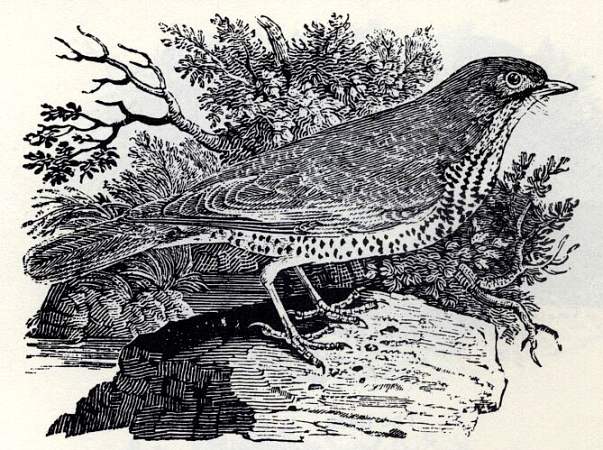January 2

Missel thrush, or storm cock, T. Bewick. The ‘storm cock’ so-called from its habit of singing in bad weather.
- 1783: January 2, 1783 – Vast hoar frost. Frost comes within doors.
- 1780: January 2, 1780 – Vast condensations, & drippings from the trees.
- 1778: January 2, 1778 – There is reason to fear that the plasterer has done a mischief to the last coat of my battin-plaster that should carry the paper of my room by improvidently mixing wood-ashes with the morter; because the alcaline salts of the wood will be very long before they will be dry at all, & will be apt to relax & turn moist again when foggy damp weather returns. If any ashes at all he should have used sea-coal, & not vegetable ashes; but a mixture of loam & horses dung would have been best.
- 1776: January 2, 1776 – Grey & white wagtails appear every day; they never leave us.
- 1775: January 2, 1775 – Grey, & white water-wagtails appear every day; they never leave us in the winter.
- 1772: January 2, 1772 – Frost, clouds, sprinkling, dark.
- 1770: January 2, 1770 – Grey, small rain. Storm-cock, turdus viscivorus, sings.
Notes:
English History Online gives White as one of the few sources for the term “battin plaster”:
“In the context of the source it appears to have been a PLASTER intended for spreading on BATTENs as a wall surface, the final layer of which was intended to take the WALLPAPER [Diaries (White)]. [Inventories (1783)] gives some clues on the preparation for a wall to take plaster in an entry that lists 23 ‘battins under the laths and hair’.
Not found in the OED online
Sources: Diaries.”
Google books provides a page with a glimpse of historical plaster recipes, including ones involving ashes, loam, and horse dung.
English History Online is an enchanting and vast resource I’ve only just stumbled upon– amongst its panoply of treasures, lists of Debating Society topics that give a flavour of the age:
1175. January 11, 1787 Coach-Makers Hall Debating Society
‘Which is more blameable, the man who deliberately seduces a female, and then deserts her, or the father who abandons his daughter so seduced?’
The discussion of the Question contained ‘persuasive eloquence [which] was laudably employed in the cause of virtue. Several young speakers distinguished themselves on the occasion, proving their claims to the flattering plaudits they received from a very numerous, polite, and liberal auditory. A majority fixed the greater blame on the Parent.
The managers trust, that every Gentleman who enters this assembly, will perceive the propriety of submitting to the sense of the majority of it, remembering that true liberty is to act as we ought, and that decorum is the companion of good sense.
Upon these principles young speakers may rest assured of receiving the most encouraging indulgence, from that disinterested candour and liberality, which the audience at this society have ever manifested.’ Morning Herald
 Theme Ported to
Theme Ported to